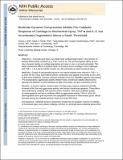Moderate dynamic compression inhibits pro-catabolic response of cartilage to mechanical injury, TNF-α and IL-6, but accentuates degradation above a strain threshold
Author(s)
Li, Yang; Frank, Eliot; Wang, Yang; Chubinskaya, Susan; Huang, Han-Hwa; Grodzinsky, Alan J.; ... Show more Show less
DownloadGrodzinsky_Moderate dynamic.pdf (1.864Mb)
PUBLISHER_CC
Publisher with Creative Commons License
Creative Commons Attribution
Alternative title
Moderate dynamic compression inhibits pro-catabolic response of cartilage to mechanical injury, tumor necrosis factor-α and interleukin-6, but accentuates degradation above a strain threshold
Terms of use
Metadata
Show full item recordAbstract
Objective
Traumatic joint injury can initiate early cartilage degeneration in the presence of elevated inflammatory cytokines (e.g., tumor necrosis factor (TNF)-α and interleukin (IL)-6). The positive/negative effects of post-injury dynamic loading on cartilage degradation and repair in vivo are not well-understood. This study examined the effects of dynamic strain on immature bovine cartilage in vitro challenged with TNF-α + IL-6 and its soluble receptor (sIL-6R) with/without initial mechanical injury.
Methods
Groups of mechanically injured or non-injured explants were cultured in TNF-α + IL-6/sIL-6R for 8 days. Intermittent dynamic compression was applied concurrently at 10%, 20%, or 30% strain amplitude. Outcome measures included sulfated glycosaminoglycan (sGAG) loss (dimethylmethylene blue (DMMB)), aggrecan biosynthesis ([superscript 35]S-incorporation), aggrecanase activity (Western blot), chondrocyte viability (fluorescence staining) and apoptosis (nuclear blebbing via light microscopy), and gene expression (qPCR).
Results
In bovine explants, cytokine alone and injury-plus-cytokine treatments markedly increased sGAG loss and aggrecanase activity, and induced chondrocyte apoptosis. These effects were abolished by moderate 10% and 20% strains. However, 30% strain amplitude greatly increased apoptosis and had no inhibitory effect on aggrecanase activity. TNF + IL-6/sIL-6R downregulated matrix gene expression and upregulated expression of inflammatory genes, effects that were rescued by moderate dynamic strains but not by 30% strain.
Conclusions
Moderate dynamic compression inhibits the pro-catabolic response of cartilage to mechanical injury and cytokine challenge, but there is a threshold strain amplitude above which loading becomes detrimental to cartilage. Our findings support the concept of appropriate loading for post-injury rehabilitation.
Date issued
2013-09Department
Massachusetts Institute of Technology. Department of Biological EngineeringJournal
Osteoarthritis and Cartilage
Publisher
Elsevier
Citation
Li, Y., E.H. Frank, Y. Wang, S. Chubinskaya, H.-H. Huang, and A.J. Grodzinsky. “Moderate Dynamic Compression Inhibits Pro-Catabolic Response of Cartilage to Mechanical Injury, Tumor Necrosis Factor-α and Interleukin-6, but Accentuates Degradation Above a Strain Threshold.” Osteoarthritis and Cartilage 21, no. 12 (December 2013): 1933–1941.
Version: Author's final manuscript
ISSN
10634584
1522-9653